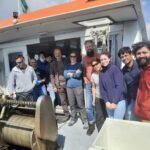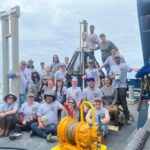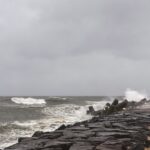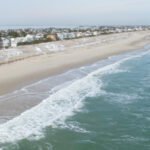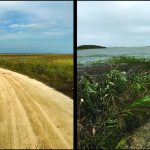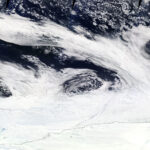SEBS faculty are involved in three out of these four cross school collaborations, interdisciplinary projects chosen to foster innovative research benefiting the public and addressing pressing global issues. Rutgers University–New Brunswick has selected four submissions to the Chancellor-Provost Challenge: Toward the Common Good, which invited innovative proposals from the Rutgers community for transformational, campus-wide initiatives to help fulfill […]
Understanding the Impact of Marine Viruses on the Ocean’s Carbon Cycle and Role in Climate Change
To address one of the most pressing issues impacting human civilization, pioneering work by EOAS faculty members Kay Bidle, professor in the Department of Marine and Coastal Sciences, and Kimberlee Thamatrakoln, is for the first time, changing the ways scientists understand the impact marine viruses have on phytoplankton, the ocean’s role in the carbon cycle […]
Rutgers Science and Outreach Onboard the R/V Atlantis
by Lauren Neitzke Adamo, assistant teaching professor, Institute of Earth, Ocean and Atmospheric Sciences In June 2022, a team of scientists and educators embarked on a 14-day expedition in the North Atlantic Ocean onboard the R/V Atlantis in search of deep-sea mud. Led by chief scientist and professor, Liz Sikes, Department of Marine and Coastal […]
Announcement: Prof. Julie Lockwood Appointed Interim Director of EOAS
Announcement by Francine Conway, Chancellor-Provost, Rutgers University-New Brunswick. Julie Lockwood, professor in the Department of Ecology, Evolution, and Natural Resources at the School of Environmental and Biological Sciences, will serve as Interim Director of the Rutgers Institute of Earth, Ocean, and Atmospheric Sciences (EOAS) beginning Feb. 3. Lockwood brings strong leadership to EOAS, especially through […]
Rutgers Awarded $20M NSF Grant to Lead Regional Large-Scale Coastlines and People Megalopolitan Coastal Transformation Hub
The new hub will help improve the understanding and governance of co-evolving hazard developments and coastal processes Advancing its mission and leadership role to improve climate risk management critical to societal well-being, Rutgers, The State University of New Jersey will lead a multi-university Megalopolitan Coastal Transformation Hub (MACH) made possible by a grant through the National Science […]
Rutgers Leads Effort to Tackle Coastal Climate Crisis Through $20M NSF Grant
Universities join together to provide the research to work towards more resilient, sustainable coastlines Rutgers will take the lead – with a $20 million grant from the National Science Foundation – to develop a plan with universities throughout the country to protect coastal areas increasingly threatened by extreme weather caused by climate change. The university […]
Shoring Up the Jersey Shore
Coastal communities are increasingly threatened by severe weather. The Coastal Climate Risk and Resilience initiative trains Rutgers graduate students to collaborate with local decision-makers and help vulnerable communities prepare for the impact of climate change. In 2012, New Jersey residents got an alarming tutorial on what unmitigated climate change portends when Hurricane Sandy, one of […]
Atmospheric Conditions: Earth 2100 Will Monitor Regional Weather Dynamics as a Model for Managing Climate Change
Editor’s Note: This article first appeared in the Spring 2021 issue of Rutgers Magazine in the feature titled “Thinking Big” Rutgers Big Ideas—an initiative of 12 bold projects with global implications—will draw on the university’s academic, health care, and research expertise to make the world a better place. For more than 250 years, Rutgers has […]
Sea-Level Rise in 20th Century was Fastest in 2,000 years Along Much of East Coast
Global increase from melting ice and warming oceans is most significant change since 1800 The rate of sea-level rise in the 20th century along much of the U.S. Atlantic coast was the fastest in 2,000 years, and southern New Jersey had the fastest rates, according to a Rutgers-led study. The global rise in sea level from […]
Atmospheric Rivers Help Create Massive Holes in Antarctic Sea Ice
Warm, moist rivers of air may have continent-wide effects and influence climate change Warm, moist rivers of air in Antarctica play a key role in creating massive holes in sea ice in the Weddell Sea and may influence ocean conditions around the vast continent as well as climate change, according to Rutgers co-authored research. Scientists […]


